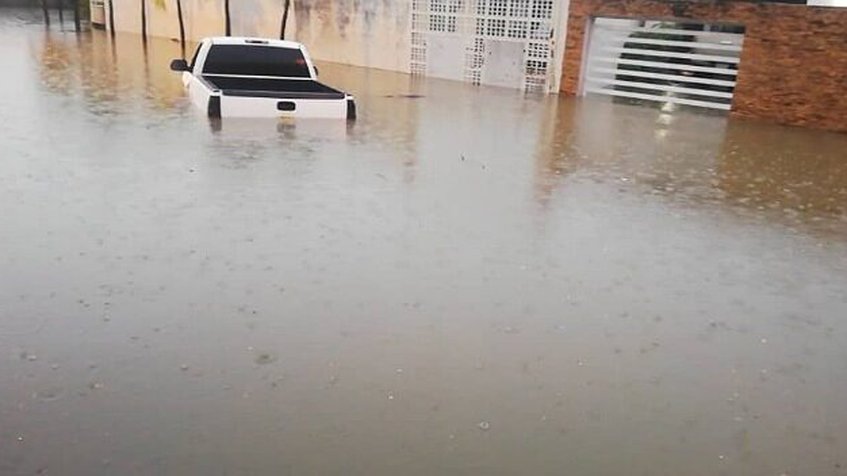15 dead, 2,500 stranded in flood-hit Venezuelan regions
Heavy rains on Monday and Tuesday affected at least ten states. Control Ciudadano warned that military participation increased in Maduro’s cabinet again. There were 140 attacks and security incidents against NGOs and human rights activists in July


Photo: El Universal
- Heavy rains on Monday and Tuesday affected at least ten states. It’s a problem caused by public policy, not by the weather.
- In Merida, 15 people died in Tovar, including children, dozens still missing.
- Bolívar has been in a state of alert because of the flooding of the Caroní and Orinoco rivers. At least 2,500 people have lost their homes.
- Two purifying plants have suffered damages in Yaracuy.
- Hundreds of Indigenous homes have been affected in Amazonas and Delta Amacuro and in Apure, with plains that have been historically prone to flooding, inhabitants have had to use curiaras because of the collapse of public roads.
- Meanwhile, chavismo sent a second shipment of humanitarian aid to Haiti.

The rains registered on the afternoon of Monday, August 23, affected communities in several areas of Caracas and other states of the country, including Miranda, La Guaira, Mérida and Táchira.
Photo: El Universal
- Reuters reported that PDVSA signed an agreement with an unknown local company called Supraquimic C.A., to exchange oil for food. However, in March 2021, they issued arrest warrants against the president of Supraquimic, Oscar García, and José Llamozas, owner of a firm that sold food to Supraquimic.
- Llamozas was called for a meeting in PDVSA offices and was arrested in the parking lot. He was in prison for three months and is awaiting trial. The piece shows the opacity of oil business in Venezuela, as a way to bypass the sanctions and proves the potential dangers of doing business with chavismo and their idea of justice.
- The Inter-Parliamentary Union (IPU) must tread carefully in a country with two parliaments that claim to be legitimate: the one represented by Juan Guaidó, elected in 2015, or the one presided by Jorge Rodríguez since 2020.
- They also face the challenge of studying over 100 cases of political persecution against opposition deputies.
- After a meeting with Duarte Pacheco, Guaidó said that this visit is an opportunity for UPI members to confirm the violations against human rights on site, and compare reality to “the regime’s narrative.” Guaidó ratified that the next round of negotiations in Mexico will start on September 3rd, and insisted there are no conditions or guarantees for the election in November.
- Ramón José Medina and José Luis Cartaya resigned from their positions as president and secretary-general of MUD. They said it was because of the opposition leader’s indecision on participating or not in the election.
- “The parties are discussing how to use this process to benefit the democratic struggle, nobody is hoping holding a political office will solve the conflict (…) the decision will be made thinking about Venezuela,” said Juan Guaidó yesterday.
- Carlos Ocariz believes the opposition parties will reach an agreement. He said that “we have to keep fighting for conditions that will allow for as fair elections as possible.”
- Delcy Rodríguez said that they’ll deliver a letter to the ICC prosecutor, detailing the impact of the sanctions. She blamed the sanctions for a wide range of things, including the lack of vaccines.
Control Ciudadano warned that military participation increased in Maduro’s cabinet again. Rocío San Miguel insisted that appointing military officers also means a castrista structure in their employees, which strengthens the militarization of the State.
- Cosme Arzolay was sworn in as the new governor of Monagas until November.
- Médicos Unidos warned that with our low vaccination rate, the delta variant and the start of the campaign, there’s risk of higher infection rates.
- The Medical Federation of Venezuela celebrated its 76th anniversary. President Douglas León Natera warned about the exodus of medical personnel, deaths in the sector and the dire state of the public hospital system. He demanded the regime to inform the public on when the next doses of Sputnik V will arrive.
- The Centro para los Defensores y la Justicia (CDJ) registered 140 attacks and security incidents against NGOs and human rights activists in July, the month with the highest number of cases.
Read more about the reasons behind Maduro’s increased persecution of independent journalists and the criminalization of humanitarian aid workers and human rights activists: Why Is Maduro Harassing Venezuelan NGOs?
- A group of lawyers and members of civil society asked to include in the negotiation agenda a proposal to call for a National Constituent Assembly, “that leads to refounding the nation,” said the Delegate Commission.
- Maduro’s new Foreign minister, Félix Plasencia, met with Russian ambassador Serguei Melik-Bagdasarov to “strengthen the relationship between both countries.”
- The Venezuelan delegation did the Parade of Nations during the opening ceremony of the Tokyo Paralympics 2020, where there will be 4,400 athletes from 162 countries. Even though the Afghan delegation couldn’t travel, their flag was included in solidarity.
Caracas Chronicles is 100% reader-supported.
We’ve been able to hang on for 21 years in one of the craziest media landscapes in the world. We’ve seen different media outlets in Venezuela (and abroad) closing shop, something we’re looking to avoid at all costs. Your collaboration goes a long way in helping us weather the storm.
Donate


